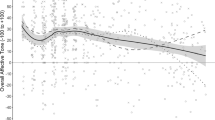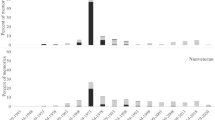Abstract
The purpose of this study was to compare the most important life events reported by U.S. and Japanese centenarians. This study included a population-based sample of 239 U.S. centenarians from the Georgia Centenarian Study and 304 Japanese centenarians from the Tokyo Centenarian Study. Two open-ended life events questions were categorized and grouped into different life event domains. Several cross-tabulations were computed to investigate culture and gender differences in most important life event domains. Next, four configural frequency analyses were conducted using Neuroticism, Extraversion, and the first most often mentioned life event domain for each sample (i.e., marriage and historical life events). Results suggest that events related to marriage were the most frequent important event domains mentioned by U.S. centenarians. The Japanese sample was more likely to report historical events. Men from the U.S. were more likely to report events related to work and retirement compared to U.S. women, and U.S. women reported events related to family as the most important life events when compared to U.S. men. Japanese women considered events related to marriage, death and grief as the most important life events when compared to Japanese men. In addition, Japanese men reported events related to work and retirement as the most important life events. A cross-cultural difference was found in life events: U.S. centenarians were more likely to mention positive experiences related to marriage and children, whereas Japanese centenarians reported mostly negative and traumatic experiences such as historical, death/grief, and work/retirement events.
Similar content being viewed by others
References
Barclay, C. R. (1995). Autobiographical remembering: Narrative constraints on objectified selves. In D. C. Rubin (Ed.), Remembering our past: Studies in autobiographical memories. New York: Cambridge University Press.
Berntsen, D., Willert, M., & Rubin, D. C. (2003). Splintered memories or vivid landmarks? Qualities and organization of traumatic memories with and without PTSD. Applied Cognitive Psychology, 17, 675–693.
U.S. Census Bureau (2011). 2010 Census Summary File 1 – United States. Retrieved from http://www.census.gov/prod/cen2010/briefs/c2010br-03.pdf.
Costa, P., & Kastenbaum, R. (1967). Some aspects of memories and ambitions in centenarians. Journal of Genetic Psychology, 110, 3–16. doi:10.1080/00221325.1967.10533711.
Costa, P. T., Jr., & McCrae, R. R. (1992). Revised NEO Personality Inventory (NEO-PI-R) and NEO Five-Factor Inventory (NEO-FFI) professional manual. Odessa: Psychological Assessment Resources.
Danish, S. J., Smyer, M. A., & Nowak, C. (1980). Developmental intervention: Enhancing life-event processes. In S. J. Danish, M. A. Smyer, C. Nowak, P. B. Baltes, & O. G. Brim Jr. (Eds.), Life-Span Development and Behavior (Vol. 3, pp. 339–366). New York: Academic Press.
Dohrenwend, B. S., Krasnoff, L., Askenasy, A. R., & Dohrenwend, B. P. (1978). Exemplification of a method for scaling life events: the PERI Life Events Scale. Journal of Health and Social Behavior, 19, 205–229. doi:10.2307/2136536.
Ehlers, A., & Clark, D. M. (2000). A cognitive model of posttraumatic stress disorder. Behavior Research and Therapy, 38, 319–345.
Ensel, W. M. (1991). “Important” life events and depression among older adults: the role of psychological and social resources. Journal of Aging and Health, 3, 546–566. doi:10.1177/089826439100300407.
Eysenck, H. J. (1980). Personality, marital satisfaction, and divorce. Psychological Reports, 47, 1235–1238. doi:10.2466/pr0.1980.47.3f.1235.
Folstein, M. F., Folstein, S. E., & McHugh, P. R. (1975). “Mini-mental state”: a practical method for grading the cognitive state of patients for the clinician. Journal of Psychiatric Research, 12, 189–198.
Hirose, N., Arai, Y., Gondo, Y., Nakazawa, S., Takayama, M., Ebihara, Y., & Kojima, T. (2004). Tokyo Centenarian Study: aging inflammation hypothesis. Geriatrics and Gerontology International, 4, S182–S185. doi:10.1111/j.1447-0594.2004.00194.x.
Hofstede, G. (1980). Culture’s consequences: International differences in work-related values. Beverly Hills, CA; and London: Sage.
Hofstede, G. (2001). Culture’s consequences, second edition: comparing values, behaviors, institutions and organizations across nations. Thousand Oaks: Sage.
Homma, S., Ishida, H., Hirose, N., & Nakamura, Y. (1994). Direct mail investigation of the social and physical background of centenarians in Tokyo metropolitan area [in Japanese with English abstract]. Nihon Rone Zasshi., 31, 380–387.
Kendler, K. S., Thornton, L. M., & Prescott, C. A. (2001). Gender differences in the rates of exposure to stressful life events and sensitivity to their depressogenic effects. The American Journal of Psychiatry, 158, 587–593. doi:10.1176/appi.ajp.158.4.587.
Landis, J. R., & Koch, G. G. (1977). The measurement of observer agreement for categorical data. Biometrics, 33, 159–174. doi:10.2307/2529310.
Martin, P., Raise, V. M., & Poon, L. W. (1999). Significant events in the lives of centenarians. Geronto Geriatrics, 2, 5–19.
Martin, P., da Rosa, G., Siegler, I., Davey, A., MacDonald, M., Poon, L. W., et al. (2006). Personality and longevity: findings from the Georgia Centenarian Study. Age, 28, 343–352. doi:10.1007/s11357-006-9022-8.
Martin, P., Baenziger, J., MacDonald, M., Siegler, I., & Poon, L. W. (2009). Engaged lifestyle, personality, and mental status among centenarians. Adult Development, 16, 199–208. doi:10.1007/s10804-009-9066-y.
Martin, P., MacDonald, M., Margrett, J., & Poon, L. W. (2010). Resilience and longevity: expert survivorship of centenarians. In P. Fry & C. Keyes (Eds.), New frontiers in resilient aging: life-strengths and well-being in late life (pp. 213–238). New York: Cambridge University Press.
Martin, P., da Rosa, G., & Poon, L. W. (2011). The impact of life events on the oldest old. In L. W. Poon & J. C. Mansfield (Eds.), Understanding well-being in the oldest old (pp. 96–110). New York: Cambridge University Press.
Merriam, S. B., Martin, P., Adkins, G., & Poon, L. (1995). Centenarians: their memories and future ambitions. International Journal of Aging and Human Development, 41, 117–132. doi:10.2190/7D1A-UPKW-8R6B-WH2B.
McCrae, R. R. (1982). Consensual validation of personality traits: Evidence from self-reports and ratings. Journal of Personality and Social Psychology, 43, 293–303. doi:10.1037/00223514.43.2.293.
Oman, R. F., & King, A. C. (2000). The effect of life events and exercise program format on the adoption and maintenance of exercise behavior. Health Psychology, 19, 605–612. doi:10.1037/0278-6133.19.6.605.
Poon, L. W., Clayton, G. M., Martin, P., Johnson, M. A., Courtenay, B. C., Sweaney, A. L., Merriam, S. B., Pless, B. S., & Thielman, S. B. (1992). The Georgia Centenarian Study. International Journal of Aging and Human Development, 34, 1–18. doi:10.2190/8M7H-CJL7-6K5T-UMFV.
Poon, L. W., Jazwinski, S. M., Green, R. C., Woodard, J. L., Martin, P., Rodgers, W. L., Johnson, M. A., Hausman, D., Arnold, J., Davey, A., Batzer, M. A., Markesbery, W. R., Gearing, M., Siegler, I. C., Reynolds, S., & Dai, J. (2007). Methodological considerations in studying centenarians: Lessons learned from the Georgia Centenarian Studies. In L. W. Poon & T. T. Perls (Eds.), Annual review of gerontology and geriatrics (Biopsychosocial approaches to longevity, Vol. 27, pp. 231–264). New York: Springer.
Porter, S., & Birt, A. R. (2001). Is traumatic memory special? A comparison of traumatic memory characteristics with memory for other emotional life experiences. Applied Cognitive Psychology, 15, 101–117. doi:10.1002/acp.766.
Reese, H. W., & Smyer, M. A. (1983). The dimensionalization of life events. In E. J. Callahan & K. McCluskey (Eds.), Life-span developmental psychology: Non-normative life events (pp. 1–33). New York: Academic Press.
Riemann, R., Angleitner, A., & Strelau, J. (1997). Genetic and environmental influences on personality: A study of twins reared together using the self- and peer report NEO-FFI scales. Journal of Personality, 65, 449–475. doi:10.1111/j.1467-6494.1997.tb00324.x.
Robine, J.-M., & Saito, Y. (2009). The demography of the oldest old in Japan. Frontiers of Japanese demography. Heidelberg: Springer Demographic Research Monographs.
Shimonaka, Y., Nakazato, K., Gondo, Y., & Takayama, M. (1999). Revised NEO Personality Inventory (NEO PI-R) and NEO Five-Factor Inventory (NEO-FFI) manual for the Japanese Version [in Japanese]. Tokyo: Tokyo Shinri.
Takayama, M., Hirose, N., Arai, Y., Gondo, Y., Shimizu, K., Ebihara, Y., Yamamura, K., Nakazawa, S., Inagaki, H., Masui, Y., & Kitagawa, K. (2007). Morbidity of Tokyo-area centenarians and its relationship to functional status. Journal of Gerontology: Medical Sciences, 62A, 774–782.
Triandis, H. C. (1994). Major cultural syndromes and emotion. In K. Shinobu & M. H. Rose (Eds.), Emotion and culture: Empirical studies of mutual influence (pp. 285–308). Washington, DC: American Psychological Association. doi:10.1037/10152-008.
Triandis, H. C. (2001). Individualism-collectivism and personality. Journal of Personality, 69, 907–924. doi:10.1111/1467-6494.696169.
von Eye, A. (1990). Introduction to configural analyses. New York: Cambridge University Press.
von Eye, A. (2002). Configural frequency analysis—methods, models and applications. Mahwah: Lawrence Erlbaum.
von Eye, A., & Gutiérrez, E. (2004). Configural frequency analysis: the search for extreme cells. Journal of Applied Statistics, 31, 981–997. doi:10.1080/0266476042000270545.
Watson, D., Klohen, E. C., Casillas, A., Nus Simms, E., Haig, J., & Berry, D. S. (2004). Match makers and deal breakers: analyses of assortative mating in newlywed couples. Journal of Personality, 72, 1029–1068. doi:10.1111/j.0022-3506.2004.00289.x.
Acknowledgments
The Georgia Centenarian Study (Leonard W. Poon PI) was funded by 1P01AG17553 from the National Institute on Aging, a collaboration among The University of Georgia, Tulane University Health Sciences Center, Boston University, University of Kentucky, Emory University, Duke University, Wayne State University, Iowa State University, Temple University, and University of Michigan. Additional authors include S. M. Jazwinski, R. C. Green, M. MacDonald, M. Gearing, W. R. Markesbery (deceased), J. L. Woodard, M. A. Johnson, J. S. Tenover, I. C. Siegler, W. L. Rodgers, D. B. Hausman, C. Rott, A. Davey, and J. Arnold. Authors acknowledge the valuable recruitment and data acquisition effort from M. Burgess, K. Grier, E. Jackson, E. McCarthy, K. Shaw, L. Strong and S. Reynolds, data acquisition team manager; S. Anderson, E. Cassidy, M. Janke, and J. Savla, data management; M. Poon for project fiscal management.
The Tokyo Centenarian Study was supported in part by a grant from the Japanese Ministry of Health and Welfare for the Scientific Research Project on Longevity, a grant for studying the multidisciplinary approach to centenarians and its international comparison (Principal Investigator, Nobuyoshi Hirose); a grant from the Japanese Ministry of Education, Science and Culture (No.15730346); and aid for research from the Keio Health Consulting Center.
Author information
Authors and Affiliations
Consortia
Corresponding author
Rights and permissions
About this article
Cite this article
da Rosa, G., Martin, P., Gondo, Y. et al. Examination of Important Life Experiences of the Oldest-Old: Cross-Cultural Comparisons of U.S. and Japanese Centenarians. J Cross Cult Gerontol 29, 109–130 (2014). https://doi.org/10.1007/s10823-014-9223-z
Published:
Issue Date:
DOI: https://doi.org/10.1007/s10823-014-9223-z




